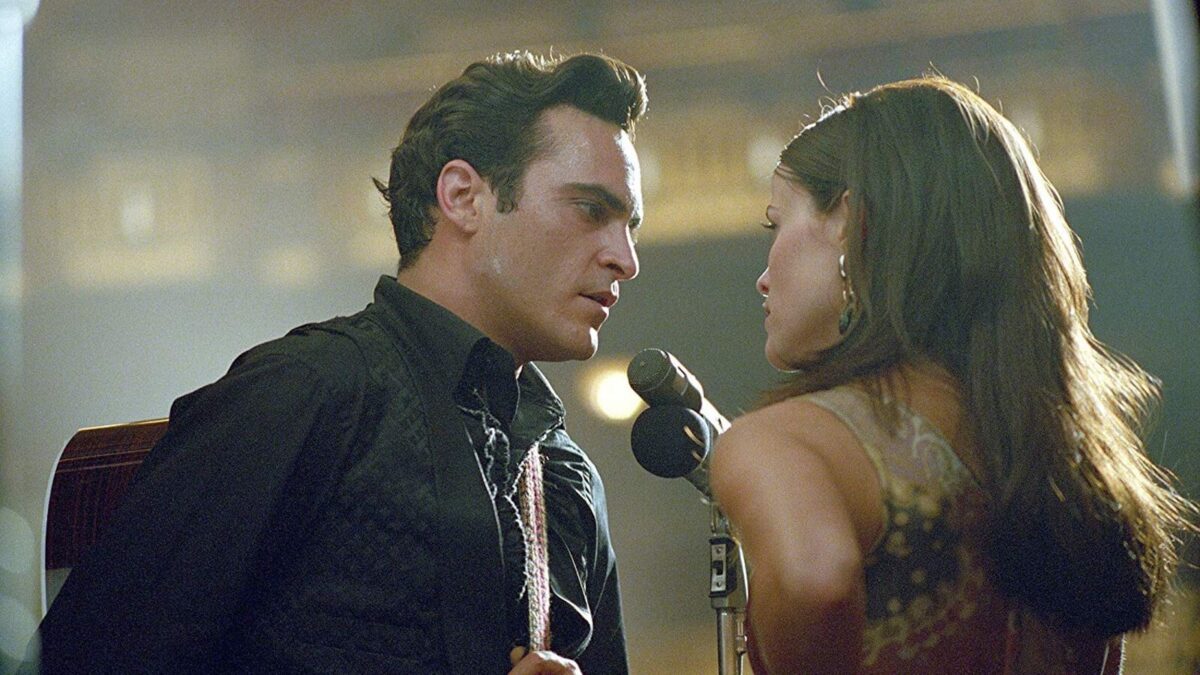I hear the train a-comin'
Here it is — the film that sent the musical biopic to the point of no return, the ultimate distillation of the life a complex and compromised artist into a Hollywood three act structure. It crystallized the beats into template that every prestige-oriented biopic for the next generation would pull from in some quantity or the other.
I’d argue its downstream impact is bad, ultimately dulling the genre into a formulaic act-off, and even retroactively making other musical biopics (like Ray) look lesser by shining a light on their narrative techniques. We were only two years away from Walk Hard spraying napalm all over the genre in one of the all-time most effective parodies.
Walk the Line at least has two undeniable things in its favor: both lead performances. It’s tough to overstate just how good Reese Witherspoon as June Carter and Joaquin Phoenix as Johnny Cash are in this film, both fully inhabiting their iconic figures and imbuing them with complexity and heart and, in the case of Phoenix, real danger. Both were rightfully nominated for Oscars for their performances. Witherspoon won and Phoenix lost to Phillip Seymour Hoffman, but I attribute that to Phoenix’s brutal competition that year.

But beyond the leads it’s a frustrating film. The script is so bland and predictable that it did the seeming impossible: It made me actively less interested in Johnny Cash as the movie went along. Everything the first act does to hint at the genius and spiritual depth is swept aside to make sure we hit the now over-familiar rise-fall antics: broken marriage, drug addiction, rock bottom, recovery with new humility, etc. James Mangold pitches it so flatly and cleanly, so engineered to a clear narrative arc, that it has no rough edges or spontaneity or introspection.
An exception: The movie really clicks when we’re hearing music (which is not often enough). No surprise given how good the source material is. Phoenix and Witherspoon, plus a few supporters as other famous figures like Jerry Lee Lewis and Elvis, sound convincing and energetic as icons of early rock and roll. My favorite moment of the movie is early on when Cash dares to embrace his wounded soul: After blowing an audition with some dull gospel music, he performs a gut-wrenching version of “Folsom Prison Blues” — and it’s the only moment that comes close to giving me chills throughout the whole film.

I think the biggest reason I have no particular affection for Walk the Line is that it has no interest in making us care. Its story does not emotionally resonate, particularly in the second half of the film. I suppose that’s the nature of a biopic, to some extent: long plateaus of troubled success tend to be a lot less narratively rich than unexpected rises. Mangold gives no indication of how he thinks the audience should feel during Cash’s rough patch or his courtship with Carter. It’s oddly vacant of voice, as if he trusts the plot itself is enough. (It’s not.)
On the visual front, Mangold does solid, unremarkable work as the director, though he’s a bit too reliant on close-up shots. There’s decent flavor for both the rural scenes and especially the music clubs, which offer some great production design. And Mangold gives Phoenix and Witherspoon plenty of room to work and light up the screen — the movie’s real key.
But it’s too little. There’s just not enough competence to make up for how hackneyed Walk the Line is. Witherspoon and Phoenix get it most of the way towards “good.” And you know what? Maybe it does get there. But the trail of destruction, one bland Oscarbait biopic after another, that Walk the Line left in its wake prevents me from giving the benefit of the doubt.
Is It Good?
Nearly Good (4/8)
Dan is the founder and head critic of The Goods. Follow Dan on Letterboxd. Join the Discord for updates and discussion.

